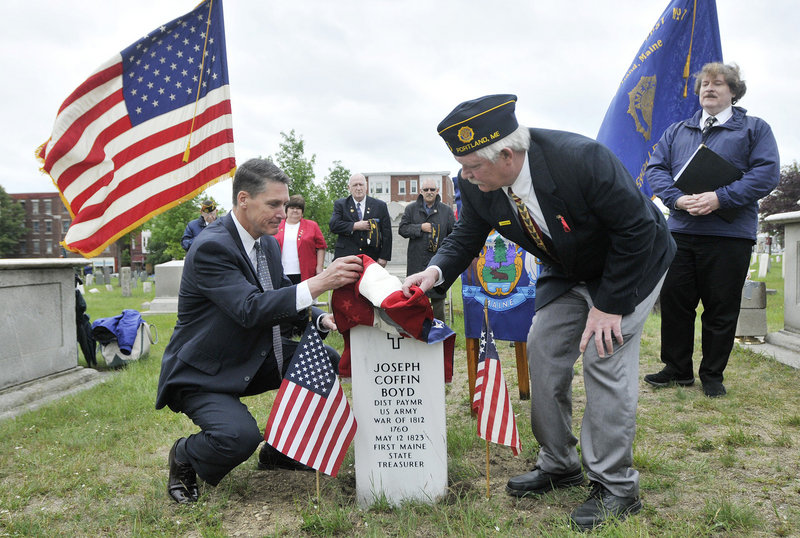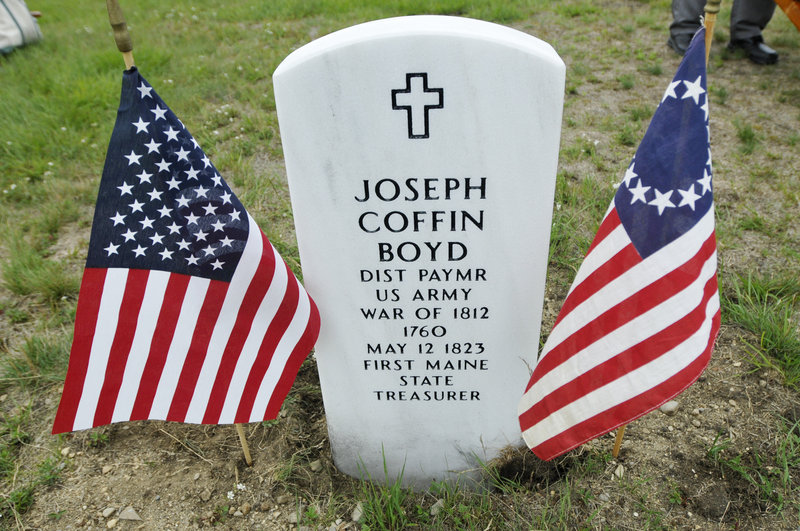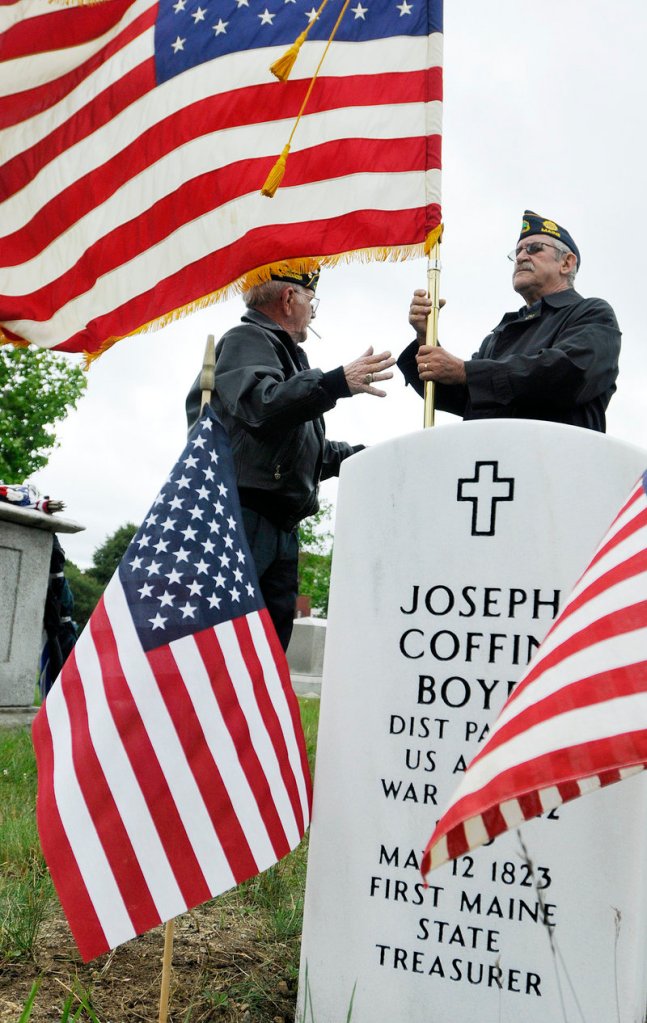Put yourself in Joseph Coffin Boyd’s place.
You’re six feet under. Have been, in fact, for 189 years.
You’ve got no headstone, no historic plaque, nothing whatsoever to commemorate the fact that you once served not only as Maine’s first state treasurer, but also as the guy responsible for paying Maine’s loyal soldiers during the War of 1812.
Ah, but you’ve got Herb Adams.
“How is it that some of us are remembered and so many of us forgotten?” bellowed Adams, Portland’s keeper of all things historic, over Tuesday morning’s stiff northerly breeze in Eastern Cemetery at the base of Munjoy Hill. “The tide that bears us all backward into oblivion is a strong one.”
It’s also a tide Adams lives to swim against.
It all began with an email. Larry Glatz, a fellow historian from Harrison who’s working on a book about Maine’s part in the War of 1812, wrote to Adams last fall seeking information about Boyd – a noteworthy figure in what many called “the Second American War of Independence” because he handled the money appropriated by the fledging federal government to pay the soldiers.
“Ever hear of this fellow?” asked Glatz. “Where does he rest?”
“Good question,” replied Adams.
For Adams, a longtime state legislator currently on term-limit hiatus, the latest in a never-ending series of historical research projects was born. And slowly but surely, a life worth remembering emerged from the historical shadows:
Joseph Coffin Boyd was born in Plymouth, Mass., in 1760, but spent most of his life in Maine. He married Isabella Southgate in 1796 and the couple had 15 children, living first on Portland’s Pleasant Street and then on Spring Street near what is now the Holiday Inn by the Bay.
Boyd was a take-charge kind of guy. In June of 1799, he led the Portland Federal Volunteers as the militia unit gathered on the steps of what is now the Wadsworth-Longfellow House on Congress Street and swore its loyalty to then-President John Adams.
“We know that Joseph Coffin Boyd, on that day, wore this: a short red coat with blue facings, white pantaloons, a white vest, black half-gaiters and a big cap trimmed with bear skin – on the front of which was a plate, star-shaped, with the letters ‘PFV’ for ‘Portland Federal Volunteers,’” reported Adams.
So proud was Portland of its federal militia that the “Ladies of Portland” gave the company a silk banner – it was presented by a young Zilpah Wadsworth, who would go on to become the mother of Henry Wadsworth Longfellow.
“We know that Miss Zilpah blushed and stammered her speech,” said Adams. “She told her diary so. And that (Boyd) looked dashing.”
Boyd spent two years as a businessman in France and then returned home to Portland, where he eventually became clerk of the court of common pleas, notary public and a deputy at the Portland customs house. Put more simply, Adams said, “he was a solid citizen of our long-ago city.”
Then came the war of 1812.
“It was a disaster for the young United States – the British burned Washington, torched the White House,” said Adams. “And it was a disaster for Maine – Boston abandoned Maine to the British. . . . Bangor surrendered without a shot. At Hampden, Maine, the American army broke and ran so fast the British called it ‘the Hampden races.’“
As the war raged on, the British revealed plans to annex Maine to Canada and rename it “New Ireland.” They also threatened to bombard the city of Portland just like they had back in 1775.
“It took faith to stand in the winds of disaster like that,” Adams said. “Joseph Coffin Boyd stood.”
Boyd became the army’s district paymaster for Maine in early 1813, serving until 1815.
“Two and a half years of travail and huge responsibility for huge sums of federal money,” noted Adams. “Paying for frontier supplies, far-flung transportation, the commissary and even fronting personal cash” for the war effort.
A case in point: In March of 1813, Boyd handed over $1,374.35 to one Capt. Westcott of Castine to pay Westcott’s soldiers. But somewhere between Portland and Castine, according to records from the first session of the 17th U.S. Congress, Westcott lost the money “by inevitable accident.”
“Whatever that means,” quipped Adams.
Boyd, well aware of how much the soldiers and their families needed the money, then paid them out of his own pocket.
“When Boyd sought repayment from the feds, inevitably the feds refused to pay up because they were lacking receipts,” said Adams. “There was no pay so there were no receipts and, because there were no receipts, there could be no repayment (to Boyd).”
“Army ‘Catch 22,’” mused Adams. “In 1812.”
Congress’ Committee of Claims eventually recommended that Boyd be reimbursed – the amount in today’s dollars would be about $68,000 – but Adams said there’s no evidence he ever got a penny.
“Such patriotism is beyond the pocketbook,” said Adams. “It’s of the heart.”
Boyd would go on to serve as the state’s first treasurer upon Maine’s admission to the union in 1820. He still held that office when, on May 13, 1823, Portland’s Eastern Argus reported with “melancholy” that Boyd had died the day before “after a short attack of typhoid fever.”
He was buried in an underground family tomb in Eastern Cemetery which, for unknown reasons, had no marker.
Adams, armed with historical documents and cemetery maps, found the spot in the middle of a cold rainstorm last winter. Around the same time, he applied for and received a white marble headstone from the Department of Veterans Affairs, which provides them for any documented veteran with an unmarked grave.
And that is how on Tuesday, Flag Day, Adams came to be standing over the freshly installed headstone along with delegations from the Military Order of the Purple Heart, American Legion Harold T. Andrews Post 17 of Portland, Marine Corps League Detachment 1324 of Southern Maine, Veterans of Foreign Wars Deering Memorial Post 6859 of Portland, and even former state Treasurer David Lemoine of Old Orchard Beach – all there to bestow honor where, for almost two centuries, honor has been due.
“So now rest and be remembered, Joseph Coffin Boyd,” intoned Adams. “Your name is now briefly famous in the distant 21st century – belatedly but deservedly so.”
After the three-volley salute, the playing of taps and the benediction by the Rev. William Doughty, Adams lingered by the headstone and thought aloud, “I wonder what he must be thinking right now.”
We can only imagine.
But the phrase “Thanks, Herb” comes to mind.
Columnist Bill Nemitz can be contacted at 791-6323 or at: bnemitz@mainetoday.com
Copy the Story Link
Send questions/comments to the editors.






Success. Please wait for the page to reload. If the page does not reload within 5 seconds, please refresh the page.
Enter your email and password to access comments.
Hi, to comment on stories you must . This profile is in addition to your subscription and website login.
Already have a commenting profile? .
Invalid username/password.
Please check your email to confirm and complete your registration.
Only subscribers are eligible to post comments. Please subscribe or login first for digital access. Here’s why.
Use the form below to reset your password. When you've submitted your account email, we will send an email with a reset code.